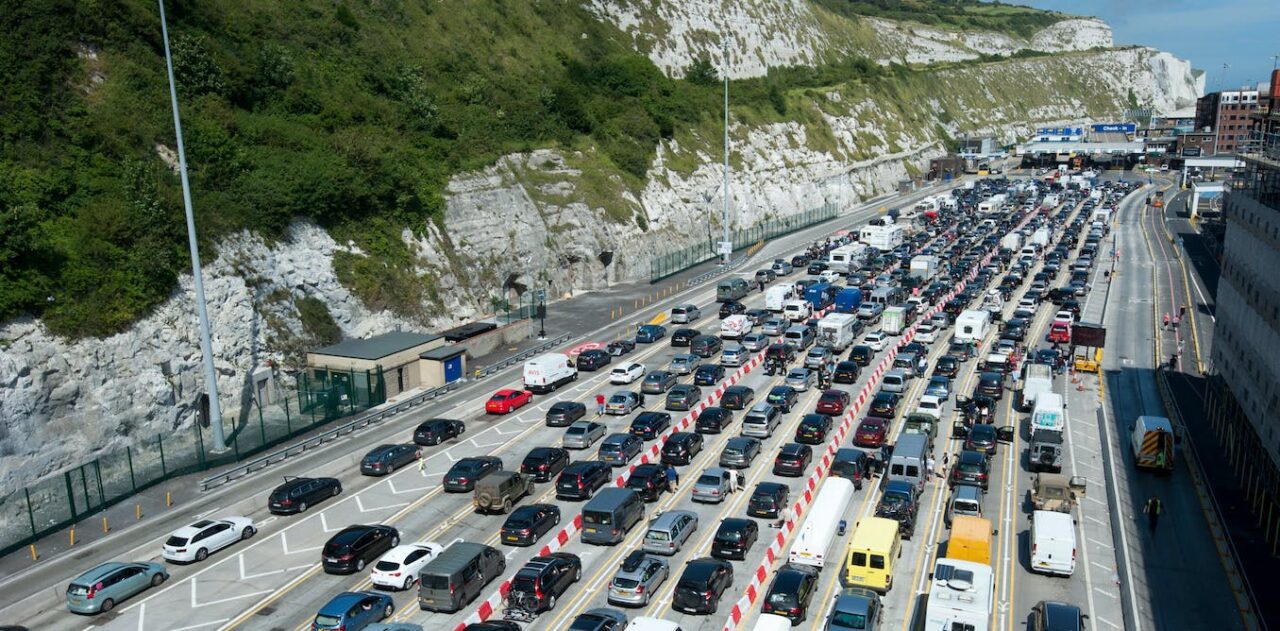Why England’s port chaos could get worse – and why technology alone isn’t the answer

Recent scenes of bumper-to-bumper traffic and queues of lorries along the roads leading to the English ports of Dover and Folkstone could become a fixture of UK travel reports without the right technological and diplomatic solutions.
The port of Dover was forced to declare a critical incident as people waiting to board ferries faced up to 11-hour wait times on Friday 22 July, the start of the busiest weekend for UK travel. The time to clear passport control was down to an hour by the following Sunday, but port authorities and ferry companies are anticipating another busy weekend ahead.
With summer holidaymakers eager to make up for lost time during the pandemic and freight traffic also increasing again post-COVID, the chance of continued congestion in and around UK transport hubs will be high for some time. At stake is not just missed connections and ruined holidays, but travellers stuck in traffic for hours without food and water and access to toilets. This is also a major challenge for freight moving from the UK to EU to export items including fresh produce that is at risk of spoiling if delayed.
Of course such scenes have become an increasingly familiar site on UK screens and front pages in recent years. The Brexit travel arrangements and cross border checks came into effect after the transition period ended in December 2020.
But this change was really only felt by the freight industry – and to an extent passenger transportation sector – in January 2022 as increased post-pandemic travel coincided with school holidays. P&O Ferries’ decision to suspend services following mass redundancies last Easter also had a similar effect.
If this was simply an operational issue it could be addressed with better resourcing and management, but there are also indications that it’s a structural and political issue resulting from Brexit. In this case, a combination of solutions will be needed to address the problem and reduce the risk of disruption for UK holidaymakers and freight transport.
Disruption theories
There are several theories about why this disruption is happening. Resourcing is clearly an issue. UK passport-holders now require a stamp and a check on the reason for travel to EU and this requires extra time with passport officials.
Further, UK reports claim France provided only six border control officials for the 12 available booths at the Dover checkpoint, while French authorities cited a travel incident in the Channel Tunnel that delayed their inspectors. Ongoing discussions over who should pay what for staffing passport controls have not helped the situation.
Brexit also features quite highly as a major reason for the travel disruption, but the exact reasoning depends on political views. In the UK, Brexiteers blame French government not providing the appropriate support, while remainers – and French officials – point to this as another reason why the UK should not have left the EU.
Lorry congestion at the English port of Dover in March 2022 after P&O Ferries’ mass redundancy action.
Andy Rain/EPA-EFE
Easing future travel
Any solution to this travel disruption will involve addressing the twin challenges of resourcing and post-Brexit UK-European relations. More French resources at the UK border will help handle the increase in paperwork processing needed as a result of Brexit. But this will require a political solution, both in terms of mutual collaboration and appropriate financing.
And even as we accept this new normal in terms of movement, weather challenges on the channel could cause further havoc. In 2019, Storm Gareth caused a seven mile-long queue of lorries as channel crossings were stopping due to the weather conditions. Tackling this issue will require both governments to improve infrastructure around their ports to hold passenger and freight traffic when ferries have been cancelled or delayed due to bad weather
Technology will also play a key role in easing some of the processing delays. Digital apps for congestion monitoring and the ability to book document processing windows may also help. But
The UK government’s goods vehicle movement service (GVMS) is a portal for freight transportation that provides a wallet for all the paperwork required for customs. This will help, but it is not the same as free movement and it will still entail processing delays compared to pre-Brexit. Small and medium companies may also need support and training to use of these digital tools for both import and export of goods between UK and EU.
From September, an EU requirement for biometric processing of all visitors to the EU from the UK (freight and passenger) will come into effect. This could cause processing delays for cars or lorry drivers at ferry or train terminals as it may require people to leave their vehicles for checks. The introduction of the EU’s UK Visa waiver programme (ETIAS) in 2023 may offset some of this increase in border processing times, however.
While there are plenty of technical solutions that can address these ongoing issues for UK freight and tourist travel, such efforts must be underpinned by greater cross-border collaboration. Politicians on both sides of the Channel must work together to identify solutions to alleviate further travel chaos.







